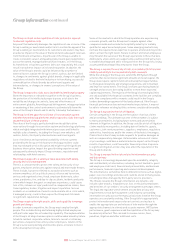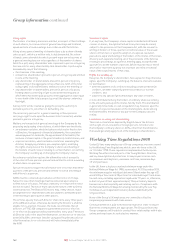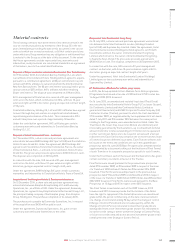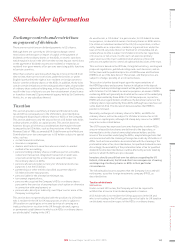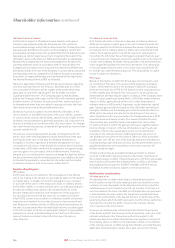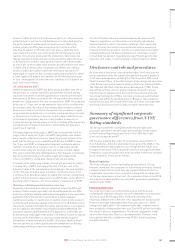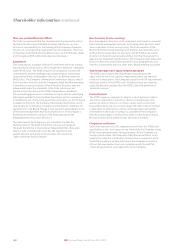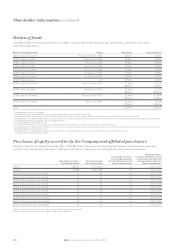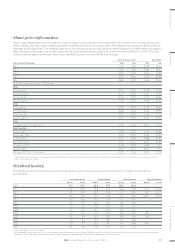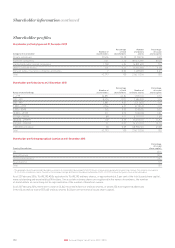Holiday Inn 2015 Annual Report Download - page 169
Download and view the complete annual report
Please find page 169 of the 2015 Holiday Inn annual report below. You can navigate through the pages in the report by either clicking on the pages listed below, or by using the keyword search tool below to find specific information within the annual report.
shares or ADSs are part of the business property of a UK permanent
establishment or pertain to a UK fixed base of an individual used for
the performance of independent personal services. Where the
ordinary shares or ADSs have been placed in trust by a settlor,
they may be subject to UK inheritance tax unless, when the trust
was created, the settlor was domiciled in the US and was not a UK
national. If no relief is given under the Convention, inheritance tax
may be charged on death and also on the amount by which the value
of an individual’s estate is reduced as a result of any transfer made
by way of gift or other undervalue transfer, broadly within seven years
of death, and in certain other circumstances. Where the ordinary
shares or ADSs are subject to both UK inheritance tax and to US
federal gift or estate tax, the Convention generally provides for either
a credit against US federal tax liabilities for UK inheritance tax paid
or for a credit against UK inheritance tax liabilities for US federal tax
paid, as the case may be.
UK stamp duty and SDRT
Neither stamp duty nor SDRT will generally be payable in the UK on
the purchase or transfer of an ADS, provided that the ADS and any
separate instrument or written agreement of transfer are executed
and remain at all times outside the UK. UK legislation does however
provide for stamp duty (in the case of transfers) or SDRT to be payable
at the rate of 1.5 per cent on the amount or value of the consideration
(or, in some cases, the value of the ordinary shares) where ordinary
shares are issued or transferred to a person (or a nominee or agent
of a person) whose business is or includes issuing depositary receipts
or the provision of clearance services. In accordance with the terms
of the deposit agreement, any tax or duty payable on deposits of
ordinary shares by the depositary or by the custodian of the depositary
will typically be charged to the party to whom ADSs are delivered
against such deposits.
Following litigation on the subject, HMRC has accepted that it will no
longer seek to apply the 1.5 per cent SDRT charge when new shares
are issued to a clearance service or depositary receipt system on the
basis that the charge is not compatible with EU law. In HMRC’s view,
the 1.5 per cent SDRT or stamp duty charge will continue to apply to
transfers of shares into a clearance service or depositary receipt
system unless they are an integral part of an issue of share capital.
This view is currently being challenged in further litigation. Accordingly,
specific professional advice should be sought before paying the
1.5 per cent SDRT or stamp duty charge in any circumstances.
A transfer of the underlying ordinary shares will generally be subject
to stamp duty or SDRT, normally at the rate of 0.5 per cent of the
amount of value of the consideration (rounded up to the next multiple
of £5 in the case of stamp duty). A transfer of ordinary shares from
a nominee to its beneficial owner, including the transfer of underlying
ordinary shares from the depositary to an ADS holder, under which no
beneficial interest passes, will not be subject to stamp duty or SDRT.
US backup withholding and information reporting
Payments of dividends and sales proceeds with respect to ADSs and
ordinary shares may be reported to the Inland Revenue Service (IRS)
and to the US holder. Backup withholding may apply to these reportable
payments if the US holder fails to provide an accurate taxpayer
identification number or certification of exempt status or fails to report
all interest and dividends required to be shown on its US federal income
tax returns. Certain US holders (including, among others, corporations)
are not subject to information reporting and backup withholding. The
amount of any backup withholding from a payment to a US holder will
be allowed as a credit against the holder’s US federal income tax liability
and may entitle the holder to a refund, provided that the required
information is timely furnished to the IRS. US holders should consult
their tax advisors as to their qualification for exemption from backup
withholding and the procedure for obtaining an exemption.
Certain US holders who are individuals (and under proposed US
Treasury regulations, certain entities controlled by individuals)
may be required to report information relating to their ownership
of non-US securities unless the securities are held in accounts at
financial institutions (in which case the accounts may be reportable
if maintained by non-US financial institutions). US holders should
consult their tax advisers regarding any reporting obligations they
may have with respect to the Company’s ordinary shares or ADSs.
Disclosure controls and procedures
As of the end of the period covered by this report, the Group carried
out an evaluation under the supervision and with the participation of
the Group’s management, including the Chief Executive Officer and
Chief Financial Officer, of the effectiveness of the design and operation
of the Group’s disclosure controls and procedures (as defined in Rules
13a-15(e) and 15d-15(e) of the Securities Exchange Act 1934). These
are defined as those controls and procedures designed to ensure
that information required to be disclosed in reports filed under the
Securities Exchange Act 1934 is recorded, processed, summarised
and reported within the specified periods. Based on that evaluation,
the Chief Executive Officer and Chief Financial Officer concluded that
the Group’s disclosure controls and procedures were effective.
Summary of significant corporate
governance dierences from NYSE
listing standards
The Group’s statement of compliance with the principles and
provisions specified in the UK Corporate Governance Code issued
by the Financial Reporting Council in the UK in 2014 (the Code)
is set out on pages 66 and 67.
IHG has also adopted the corporate governance requirements of
the US Sarbanes-Oxley Act and related rules and of the NYSE, to the
extent that they are applicable to it as a foreign private issuer. As a
foreign private issuer, IHG is required to disclose any significant ways
in which its corporate governance practices differ from those followed
by US companies. These are as follows.
Basis of regulation
The Code contains a series of principles and provisions. It is not,
however, mandatory for companies to follow these principles. Instead,
companies must disclose how they have applied them and disclose,
if applicable, any areas of non-compliance along with an explanation
for the non-compliance. In contrast, US companies listed on the NYSE
are required to adopt and disclose corporate governance guidelines
adopted by the NYSE.
Independent Directors
The Code’s principles recommend that at least half the board,
excluding the chairman, should consist of independent non-executive
directors. As at 22 February 2016, the Board consisted of the
Chairman, independent at the time of his appointment, two Executive
Directors and eight Independent Non-Executive Directors. NYSE
listing rules applicable to US companies state that companies must
have a majority of independent directors. The NYSE set out five bright
line tests for director independence. The Board’s judgement is that
all of its Non-Executive Directors are independent. However, it did
not explicitly take into consideration the NYSE’s tests in reaching
this determination.
STRATEGIC REPORT GOVERNANCE GROUP FINANCIAL STATEMENTS ADDITIONAL INFORMATIONPARENT COMPANY FINANCIAL STATEMENTS
167IHG Annual Report and Form 20-F 2015



